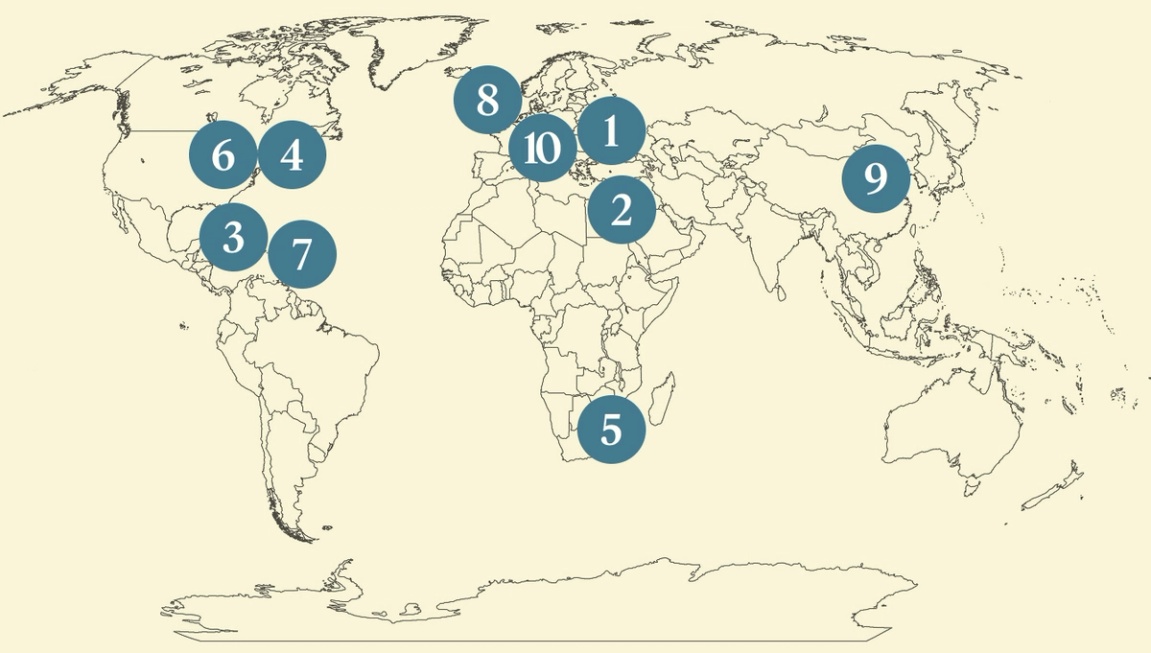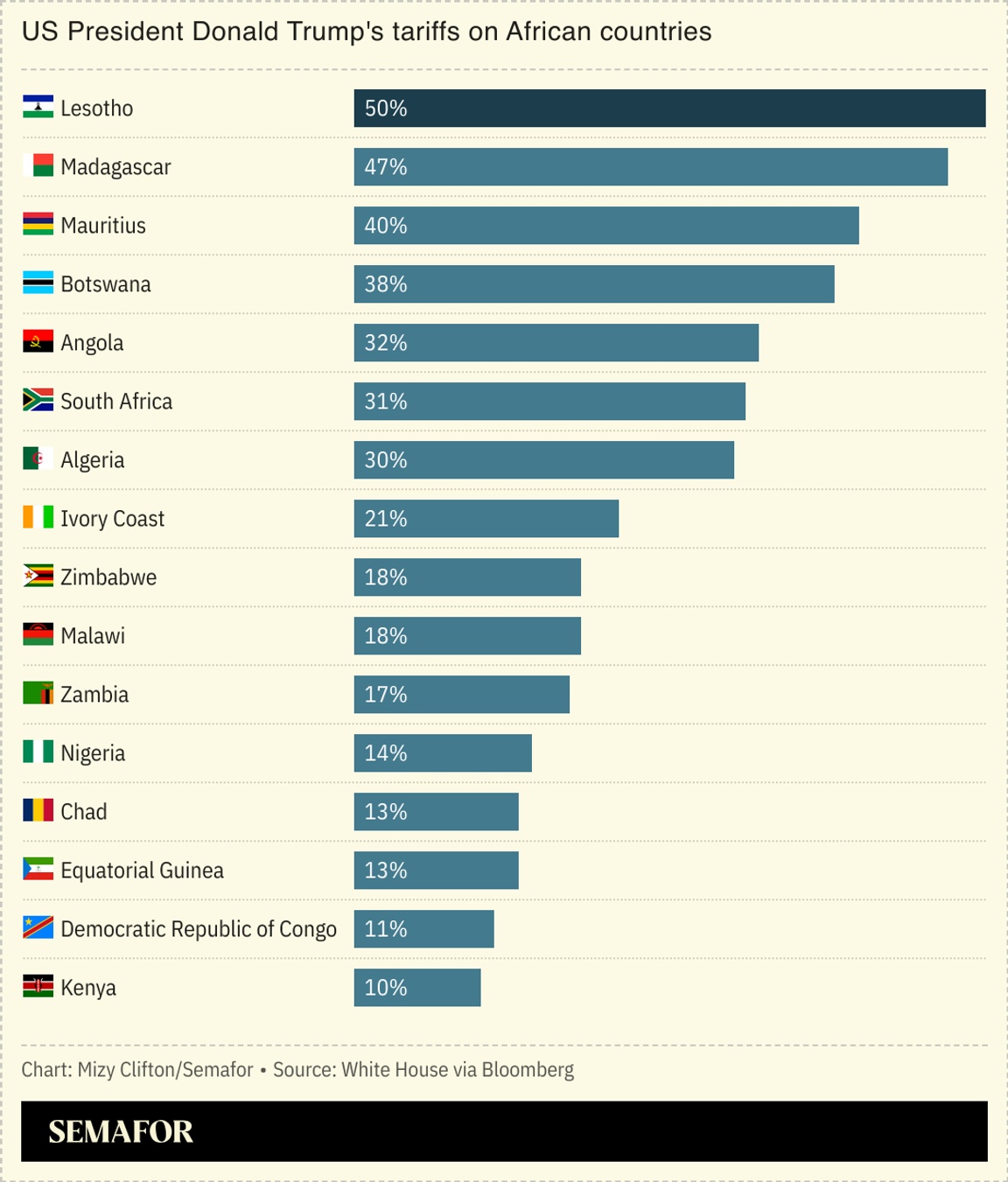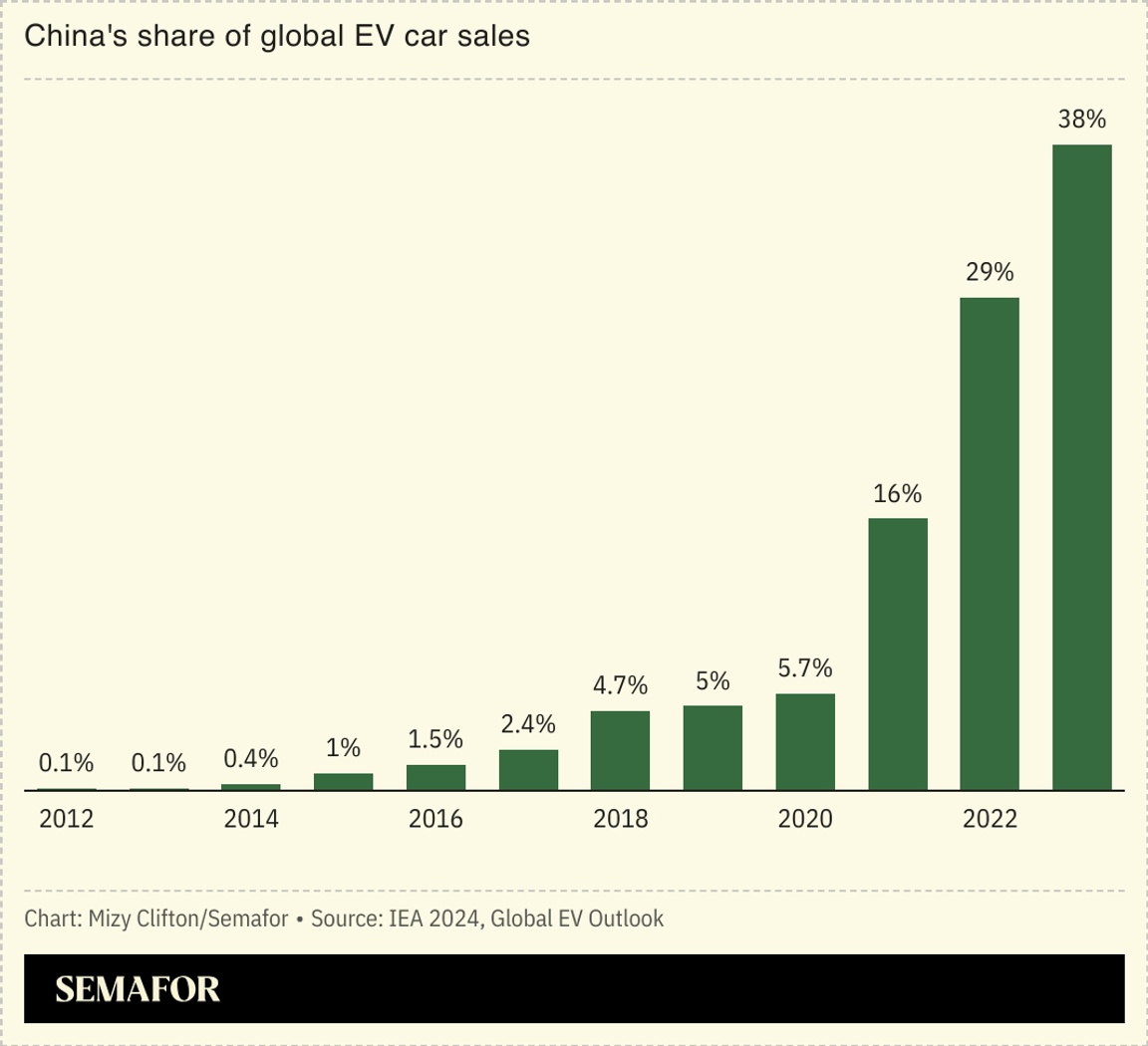| | Rubio threatens to walk away from Ukraine-Russia peace efforts, Hamas rejects Israel’s ceasefire off͏ ͏ ͏ ͏ ͏ ͏ |
| |   Indianapolis Indianapolis |   Beijing Beijing |   Champagne Champagne |
 | Flagship |  |
| |
|
The World Today |  - US may ‘move on’ from Kyiv
- Hamas rejects Israel deal
- Senator sees Ábrego García
- Trade war hits consumers
- Lesotho’s tariff woes
- Obesity pill trial success
- Haiti’s US gun problem
- UK military EV ban
- First thorium reactor
- Prosecco bubbles up
 US science is ‘totally broken,’ and recommending a ‘breathtaking’ Japanese castle. |
|
US may ‘move on’ from Ukraine talks |
 Julien de Rosa/Pool via Reuters Julien de Rosa/Pool via ReutersThe US may walk away from efforts to end the Russia-Ukraine war if no progress is made soon, the secretary of state warned. Marco Rubio said he held “productive” talks with European and Ukrainian leaders in Paris on ending the conflict — the first time European powers have been included in US-led negotiations — but added that any deal must be “doable in the next few weeks” and that “if it is not possible to end the war in Ukraine, we need to move on.” The news came shortly after Ukraine said it had agreed the outline of a deal allowing the US access to its mineral resources, including its reserves of lithium, rare earth, and uranium. Kyiv’s economy minister said a memorandum of intent had been signed, and Trump said he expected the deal to be signed next Thursday. |
|
Hamas rejects Israel truce |
 Ramadan Abed/File Photo/Reuters Ramadan Abed/File Photo/ReutersHamas rejected Israel’s offer of a ceasefire deal. Israeli Prime Minister Benjamin Netanyahu’s government had proposed a 45-day truce in exchange for the release of 10 of the remaining hostages taken in the Oct. 7, 2023 attacks: 59 remain unaccounted for, and 24 are believed to still be alive. But Hamas said it wanted a permanent end to the war, for which it would return all the hostages. Israel continues to bombard Gaza, with the latest strikes killing at least 37, the BBC reported, and continues to block all humanitarian aid from entering the enclave. The war is increasingly unpopular in Israel, with 120,000 people, including active service members, signing a petition calling for its immediate end. |
|
US senator meets with deportee |
|
US-China decoupling underway |
 Casey Hall/Reuters Casey Hall/ReutersA rapid decoupling of the US and China is hurting consumers and businesses alike, as the economic giants remain locked in a trade war. Ultra-cheap retailers Temu and Shein are raising prices next week, hit by tariffs and the end of the de minimis rule allowing duty-free imports under $800. Meanwhile Hong Kong — a gateway between China and the West, especially for China’s tech startups — said its postal service would stop delivering to the US, after US President Donald Trump closed a loophole allowing some tariff-free trade via the city. And in a move with long-term consequences for global energy markets, China has stopped buying US gas, with one analyst telling the Financial Times that the situation was likely permanent. |
|
Lesotho hit by Trump tariffs |
 Steep US tariffs on Lesotho, one of sub-Saharan Africa’s few manufacturing success stories, could cause an economic crisis. The country is the largest African exporter of garments to the US, an industry built on a Bill Clinton-era trade agreement. But President Donald Trump’s new import regime will impose 50% duties, Africa’s highest rates, once a 90-day reprieve is over. The levies will put tens of thousands of jobs on the line and limit the country’s ability to pay for electricity, the trade minister said. Maseru has offered Washington various concessions, including removing obstacles to investment and potentially accepting deportees. Among the garments made in Lesotho and threatened by the tariffs are Trump-branded golf shirts, the Financial Times noted. |
|
 Tina Brown has shaped the culture and captured the zeitgeist since she reinvented Vanity Fair and The New Yorker in the 1980s and 1990s. But now, she’s moved on to the digital media space with her Substack, Fresh Hell. This week, Ben and Max ask the magazine icon about what she makes of the state of print media today, whether we still need editors in a world filled with influencers, and what she thinks the future holds for her former employer, Condé Nast. They also talk about her gripes with our current “uncouth” culture, how we’ve all become “scavengers of info,” and the stories she would assign today if she could. Listen to the latest episode of Mixed Signals now. |
|
Daily weight-loss pill in sight |
 Mike Segar/File Photo/Reuters Mike Segar/File Photo/ReutersEli Lilly’s share price soared after it said a daily weight-loss pill showed similar results to injectable drugs Ozempic and Mounjaro. Orforglipron helped patients lose an average 7.9% of their body weight in 40 weeks in clinical trials, compared with the 1.6% weight lost by those taking a placebo. The drug was less successful at reducing blood sugar, and at high doses about a quarter of patients experienced nausea, vomiting, or diarrhea. GLP-1 drugs have transformed obesity treatments and have become some of the most popular medications in the world: About 12% of US adults have used them, and there have been regular shortages. A new version, especially in pill form, could widen access. |
|
US guns drive Haiti violence |
 Guns smuggled from the US are driving Haiti’s ongoing lawlessness crisis. Gangs control much of Haiti, with 5,601 people killed last year and an estimated one million having fled their homes. Gang members regularly pose for social media photos with US-made weapons. The BBC tracked two cases of guns seized in 2024 and found they had, like many others, been brought from Florida. More than 200 shipping containers leave Florida for Haiti each week, and the UN said the “vast majority” are not checked: The BBC noted that dozens of known gang members are listed as recipients of recent shipments from the US. One analyst said “US authorities are not doing enough” to stem the flow of weapons. |
|
 The British military bars electric vehicles from some of its bases over concerns that Chinese technology inside them could be used for spying, a lawmaker said. Almost all EVs contain at least some Chinese-made parts, thanks to Beijing’s advantage in battery and sensor technology, the Financial Times reported. The army fears those components could be monitored remotely, giving information about movements within the base. The UK defense minister told Parliament there was no military-wide policy on restricting Chinese-made EVs but that some bases had rules in place; Beijing also bans Teslas from military complexes over spying concerns. Similar worries over Chinese tech have been raised in the past, leading countries including Britain to block Huawei products from some sensitive areas, for example. |
|
China announces first thorium reactor |
 Pexels Creative Commons/Jason Hu Pexels Creative Commons/Jason HuThe world’s first thorium nuclear reactor is up and running in China. Thorium is much more abundant than uranium, and safer, with fewer radioactive byproducts. But while the possibility of thorium reactors has been mooted since the 1950s, most research, especially in the US, has focused on uranium, which is less technologically demanding and can also be used in nuclear weapons, which thorium cannot. Chinese state media said the experimental reactor began full-power operation in June and was successfully refueled in October, a key milestone meaning it can be continuously operated. Beijing compared its success to the story of the tortoise and the hare, suggesting that its patience allowed it to maintain focus on the challenge, unlike easily distracted Westerners. |
|
|